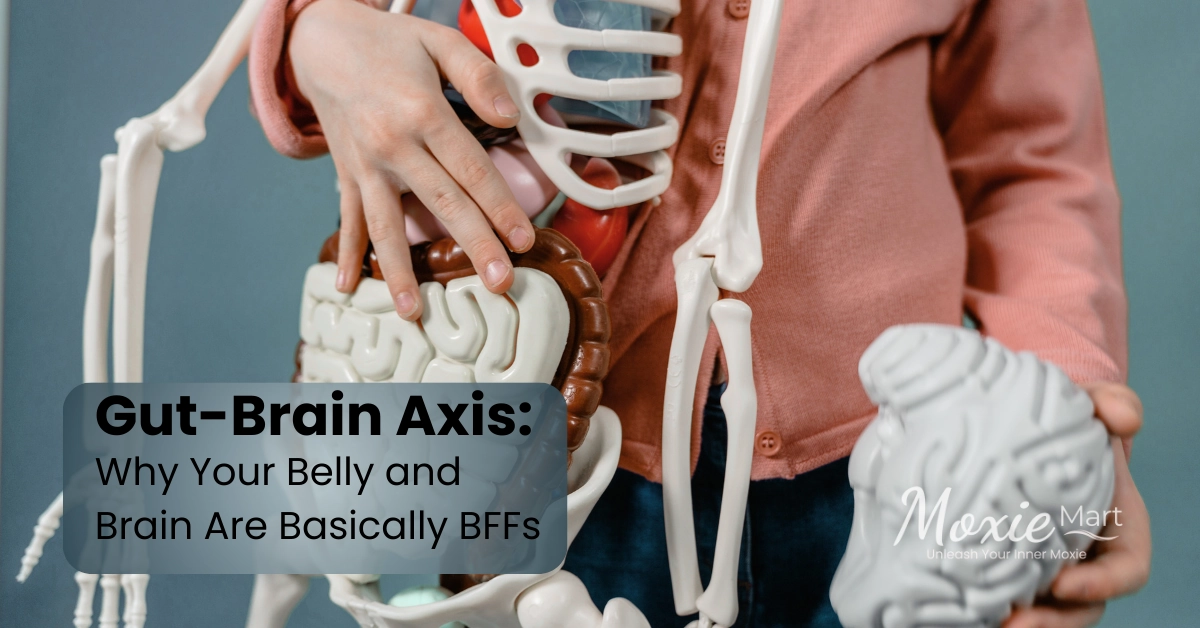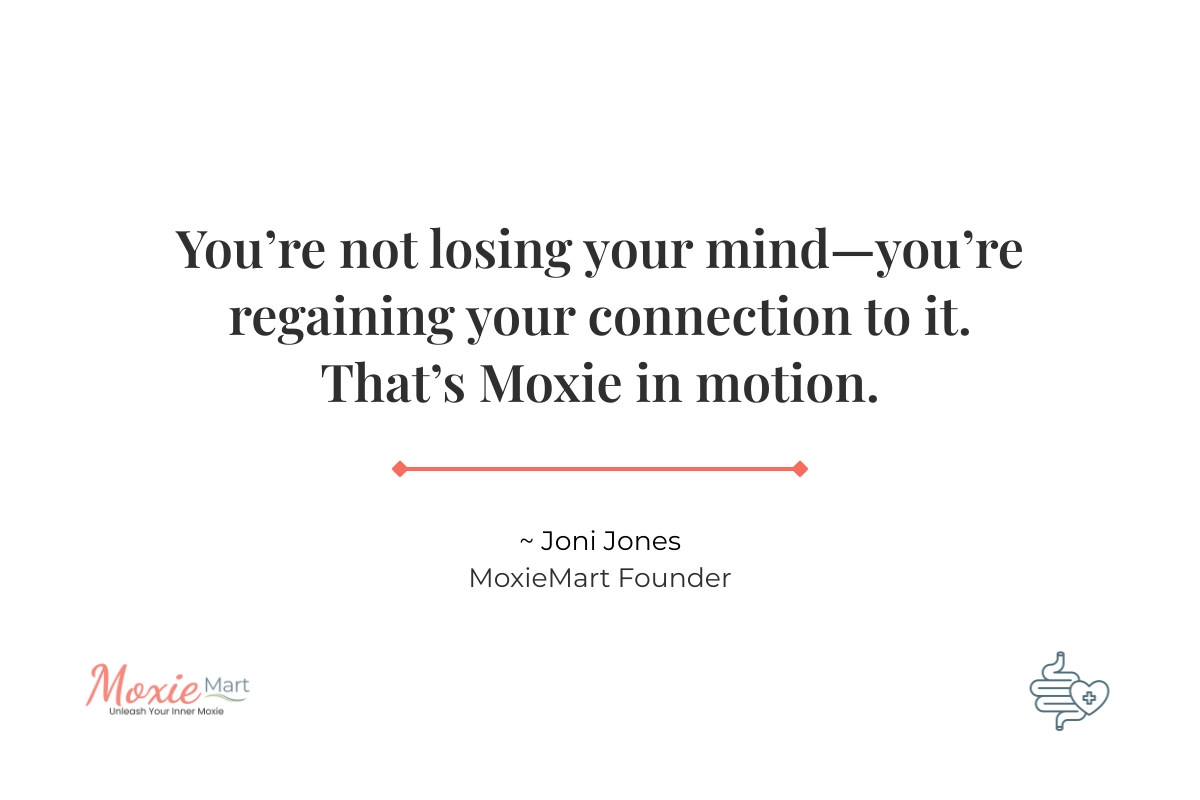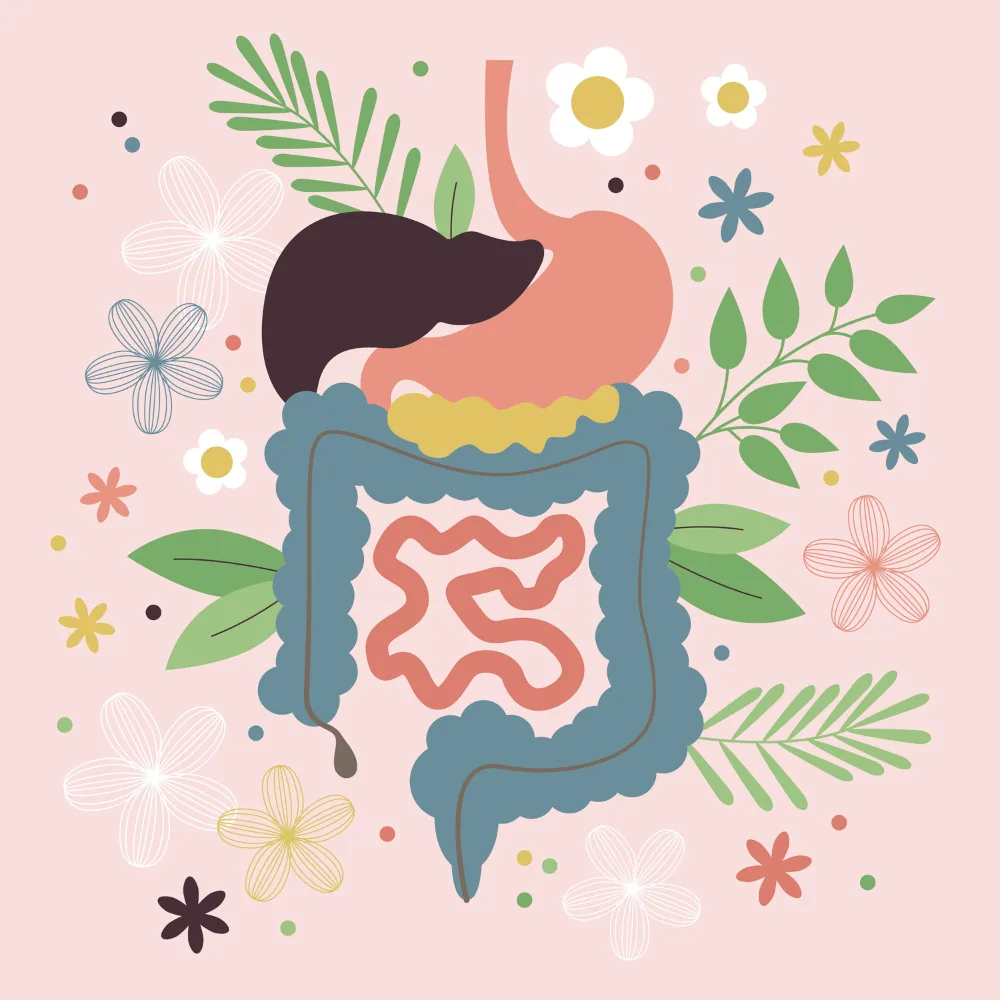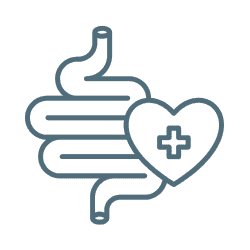
The Gut-Brain Axis:
Why Your Belly and Brain
Are Basically BFFs
How Your Gut Shapes Mood, Memory, and Mental Clarity
🗂️ Gut Health
📅 8/30/25
🏷️ Gut-Brain Connection | Emotional Resilience
Quick Gut Health Takeaways
- The Gut-Brain Axis: Why Your Belly and Brain Are Basically BFFs
- Quick Gut Health Takeaways
- What Is the Gut-Brain Axis (And Why Should You Care)?
- A Quick History: From Gut Instinct to Gut Intelligence
- Your Microbiome: The Mood-Maker in Your Middle
- Symptoms of Gut-Brain Dysfunction (It’s Not All in Your Head)
- Simple Tweaks, Major Impact (Mood, Focus, and More)
- My Gut-Brain Wake-Up Call (Joni's Story)
- Wrapping It Up: What If the Fog Isn’t Aging—It’s Gut Confusion?
- FAQ: What You Need to Know
- Referenced Studies & Sources
- Ready to Reset Your Gut (Without the Overwhelm)?

What Is the Gut-Brain Axis (And Why Should You Care)?
Your gut and brain are in constant conversation. This isn’t metaphor—it’s biology. The gut-brain axis is the two-way communication system between your central nervous system (the brain and spinal cord) and your enteric nervous system (the 100-million-neuron network lining your gut).
Think of it as your body’s own fiber-optic cable, sending chemical, electrical, and microbial messages back and forth. This system influences everything from mood and memory to digestion and immunity.
What’s wild? About 90% of the serotonin in your body—the feel-good neurotransmitter—is produced in the gut. And if your gut’s a mess, that serotonin train can derail quickly.
This system influences everything from mood and memory to digestion and immunity.
Curious how gut health actually works? Start here with Gut Health 101 →
A Quick History: From Gut Instinct to Gut Intelligence
We’ve all heard the phrase ‘gut feeling.’ Turns out, it wasn’t just poetic—it was prophetic. For decades, scientists assumed the gut was just a glorified food tube. But research in the last 20–30 years has flipped that script.
In the early 2000s, studies from places like UCLA and Johns Hopkins began proving that gut microbes influence stress responses and emotional regulation. The term ‘second brain’ was coined by Dr. Michael Gershon, who showed that the enteric nervous system could function independently of the brain—and even held sway over it. Wild, right?
This discovery laid the foundation for today’s exploding field of psychobiotics: probiotics and prebiotics designed to impact mental health.
Your Microbiome: The Mood-Maker in Your Middle
Inside your gut lives a bustling ecosystem of trillions of bacteria, fungi, and other microbes. Together, they’re called the microbiome—and they have a direct line to your brain.
Certain gut bugs produce GABA (which helps calm anxiety), others stimulate dopamine or serotonin pathways. A well-balanced microbiome = a more stable mood, sharper mind, and better sleep.
But when the microbiome is disrupted—by stress, antibiotics, poor diet, or toxins—that communication gets garbled. Mood disorders, brain fog, and fatigue often follow. Many women in midlife are told they’re just hormonal, when in fact, their gut has stopped sending the right signals.

Symptoms of Gut-Brain Dysfunction (It’s Not All in Your Head)
If you’re experiencing any of the following, your gut-brain axis may be struggling:
• Brain fog that won’t lift
• Anxiety or mood swings with no clear trigger
• Bloating or irregular digestion
• Poor stress resilience
• Trouble focusing or remembering details
These aren’t just ‘aging issues.’ They’re gut signals—clear as day if you know how to read them.
Simple Tweaks, Major Impact (Mood, Focus, and More)
You don’t need a full supplement overhaul to get started. These gut-brain resets are simple, effective, and science-backed:
• Eat fermented foods (like sauerkraut, kimchi, or coconut yogurt) daily
• Chew each bite 20–30 times to reduce digestive burden
• Drink warm lemon water in the morning to stimulate bile and peristalsis
• Avoid screens and multitasking while eating (your nervous system needs calm to digest)
Bonus: Reducing sugar, alcohol, and ultra-processed foods can lower inflammation that blocks clear thinking and contributes to hormonal imbalances.
My Gut-Brain Wake-Up Call (Joni’s Story)
For years, I chalked up my foggy brain and word-fumbling to age. I found myself stepping on my tongue more than usual, second-guessing my memory, and wondering if this was just what getting older felt like.
Spoiler alert: It wasn’t. Woot!
When I dove into gut healing again—truly prioritizing digestion, rhythm, and daily resets—it was like someone turned the lights back on. The fog lifted. My mood steadied. That moody gremlin in my head? Quieted. I felt like myself again—only clearer, sharper, and more present.
This realization cracked me wide open: I wasn’t just ‘declining.’ I was healing. This is the power of knowing about the gut-brain axis. It gives us back choice, curiosity, and power. It gives us back ourselves.
Wrapping It Up: What If the Fog Isn’t Aging—It’s Gut Confusion?
The gut-brain axis is more than a buzzword—it’s a biological bridge between how you digest and how you feel.
And the beauty? You can start strengthening that bridge today. Tune into your rhythm, nourish your microbiome, and honor your gut’s signals.
You’re not losing your mind—you’re regaining your connection to it.
That’s Moxie in motion.
FAQ: What You Need to Know
Q: What exactly is the gut-brain axis?
A: It’s the two-way communication system between your brain and your gut, driven by nerves, hormones, and the microbiome.
Q: Can my gut really affect anxiety or depression?
A: Yes—up to 90% of serotonin is made in the gut, and gut inflammation can interfere with neurotransmitter production and mood regulation.
Q: How do I know if my gut-brain connection is off?
A: If you’re experiencing brain fog, mood swings, bloating, or poor stress response, your gut-brain axis might need support.
Q: What’s one simple daily habit I can start today?
A: Chew your food thoroughly and eat without distractions. This alone can dramatically support digestion and gut-brain rhythm.
Q: Do I need supplements to heal my gut-brain axis?
A: Not necessarily. Focus on food, rhythm, and reducing stress first. Supplements can help, but they’re not the first step.
Referenced Studies & Sources
| Title | Link |
|---|---|
| The Enteric Nervous System: A Second Brain | https://www.ncbi.nlm.nih.gov/pmc/articles/PMC4367209/ |
| Gut Microbiota’s Effect on Mental Health: The Gut–Brain Axis | https://www.ncbi.nlm.nih.gov/pmc/articles/PMC7155404/ |
| Psychobiotics and the Microbiome–Gut–Brain Axis | https://www.ncbi.nlm.nih.gov/pmc/articles/PMC8077177/ |
| Microbiota and Neurotransmitters | https://www.ncbi.nlm.nih.gov/pmc/articles/PMC8626350/ |
Ready to Reset Your Gut (Without the Overwhelm)?
Kickstart your rhythm with my free 7-day reset — designed to reduce bloat, ditch the brain fog, and get you glowing again.

✨ A printable tracker to monitor your gut habits
✨ Gentle food suggestions to ease inflammation
✨ Daily nudges to support digestion + detox
✨ Optional tools to go deeper (if you’re ready).
⚡️ Instant download. No spam — just support. Full details in our disclosure policy.





